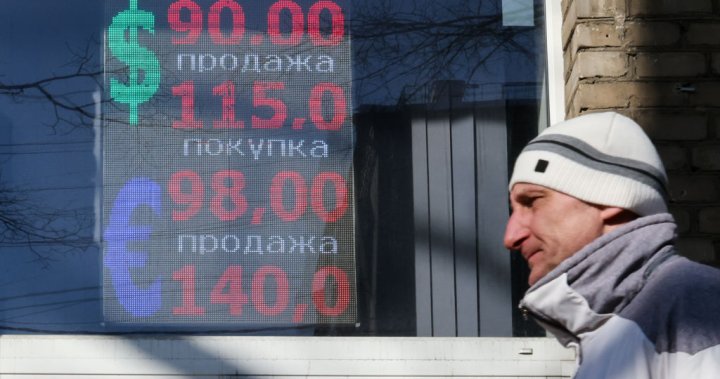
Western sanctions will sink Russian ruble, but unlikely to end war in Ukraine: experts
Global News
A dramatic drop in the ruble and fresh sanctions from Canada and other western nations will hit Russian consumers hard but might not dissuade war efforts, experts say.
The latest rounds of sanctions from Canada and other western nations will put “sustained” pressure on Russia’s tumbling currency in a move experts say is likely to hurt the country’s citizens but not yet hamper its war in Ukraine.
The Russian ruble fell as much as 30 per cent compared to the U.S. dollar on Monday morning, as the West launched new sanctions against the aggressor in eastern Europe and cut off ties of some Russian banks to the SWIFT banking system.
The ruble recovered somewhat before markets closed in Europe thanks to swift action from the Russian central bank (CBR), but fresh action from Canada and its allies to restrict the CBR’s access to international reserves will only put more pressure on the struggling currency.
In new sanctions announced Monday, western nations will restrict the Russian central bank from accessing billions in funds held in financial institutions outside the country.
The move will limit Russia’s capacity to buy up its own currency in an attempt to raise its value, constraining its ability to stem the ruble’s free-fall.
Karl Schamotta, chief market strategist at Corpay, says the new sanctions put a “sustained downward pressure on the currency itself.”
“That is the biggest collapse that we’ve seen since the end of the Soviet Union. And the biggest drop that we’ve seen in a major currency since at least 1990,” Schamotta, whose company facilitates cross-border transactions, told Global News.
Russian consumers, who already lined up in droves outside ATMs in the country to withdraw cash on Monday, will be hit hard by the ruble’s decline, said Dane Rowlands, a conflict economics professor at Carleton University.
